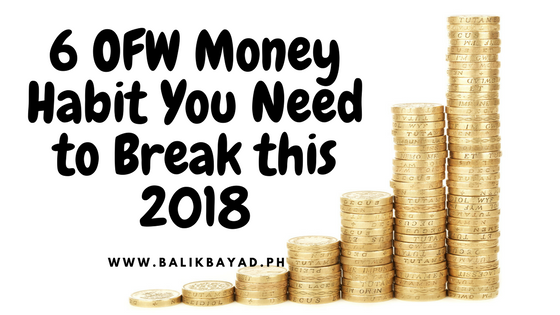 It’s the start of a new year. This means clean slate, new beginning, and a fresh page on your 365-day calendar. While the long-term goal remains the same, that is to provide a better and secure life for your family, you still list resolutions and plans for the year with the ultimate goal of achieving it by December 31.
It’s the start of a new year. This means clean slate, new beginning, and a fresh page on your 365-day calendar. While the long-term goal remains the same, that is to provide a better and secure life for your family, you still list resolutions and plans for the year with the ultimate goal of achieving it by December 31.
Since you are listing your yearly goals, you might consider writing down your financial plans and at the same time, getting rid of these bad money habits for a more financially-secure future:
The “mamaya na” habit
Admit it. Your first month salary overseas was sent back home since your family needs it more than you do. Then, you promised yourself that you will dedicate a portion of your earnings for savings starting next month, to which you failed to do – again. You may not notice it but you put off savings or setting an Emergency Fund and only promise to do so when there’s extra income. The next thing you know, you are back in Philippine soil with little savings.
Get rid of the habit by imposing discipline on yourself when it comes to saving, Do what you can now and don’t wait for rainy days to come before you start taking savings seriously.
The “pakisama-slash-manlilibre” habit
You got a two-week vacation so you decided to go home and spend time with your family. Everyone in your barangay knows that you’re coming home, so they expect “libre.” To save face, you decided to give in since you’ll earn that money spent anyway. Then there are relatives and friends who constantly ask you out for a drink, so you have no choice but to pay for everything – even if it means using the little savings you have,
It’s okay to treat once in a while, but you should know when to say no and learn how to put some boundaries, especially when money is involved. You don’t have to be friends with everyone, especially those who are taking advantage of your position. Say no when necessary.
The “bahala na sa bayaran” habit
One good thing about being overseas: some items are cheaper compared to buying them in the Philippines. You want to take advantage of that so on your next paycheck, you decided to splurge and buy a lot of goods for the family back home. It doesn’t matter if you used up your entire one month salary. You’ll earn them anyway next month.
What if someone in the family got sick even before you get your salary – what will you do? You might say “bahala na” but don’t you think it’s much better if you are prepared for situations like this?
The “para sa pamilya naman” habit
You send most, if not all, of your earnings to your family back home. You even take side jobs for additional income. While there’s nothing wrong with this mentality, you are slowly starting to take away one important factor in the equation: you.
Don’t send everything back home. Have your own savings. Set up an emergency fund (and don’t inform your family about it – yet). Prioritize your expenses. Have a break and treat yourself because you deserve it.
The “pasikat” habit
Your co-worker has a new phone. Your daughter called and asked for a tablet because her classmates have one. You bought new pair of shoes even if you just bought a par weeks ago. In other words, you give in to buying material things to make yourself and your family look “better off.”
This is okay if you have sufficient funds to sustain you for many years. If you rely on your monthly income with the danger of being out of job after your contract, then you need to re-think your priorities and stop buying things that won’t last forever.
The “hindi ko alam yan” attitude.
At one point, someone talked to you about insurance, stock market, and other forms of investment. You brushed off the idea, saying that you don’t understand it anyway. As a result, you settle for the safe and low risk without even giving investment options a chance.
Here’s the thing: it won’t make you less of a person if you ask someone who is knowledgeable about something. Take your time off to educate yourself about stocks, UITFs, mutual funds, and bonds among many others. Eventually, start small and try what the market has to offer.
This post can also help you start your investment journey even with little capital.
Are you ready to break these bad money habits?
